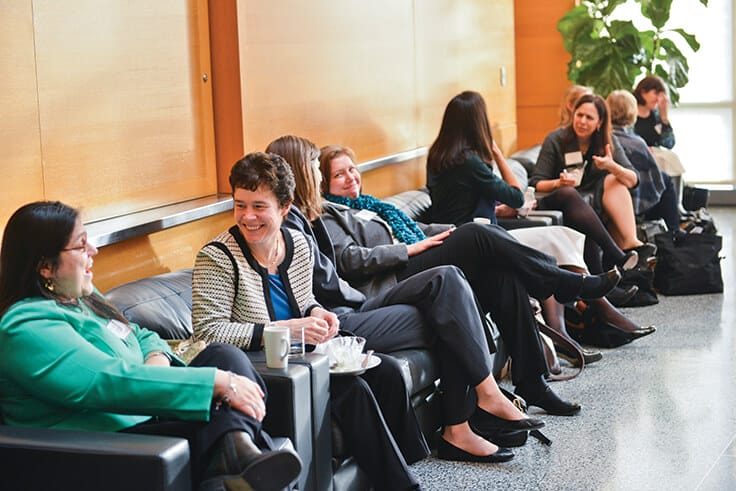The Wharton School is doing more than ever before to engage the alumnae population through Lifelong Learning.

Attendees of the 2013 Wharton Women in Business Alumnae Conference
Laura Zarrow, project director within Wharton’s Innovation Group, explains that alumnae needs are diverse and segmented based on chosen career path—entrepreneurial or corporate—and career stage. These needs are particularly pronounced for women who must step out of work for a period of time to care for children or older relatives, or for those at transitional moments in their careers.
“Those are key points at which they need Lifelong Learning and where they need to network, assess and expand their skill set,” says Zarrow.
A Wharton alumnae network is also critical for women in senior executive roles.
“The women of Wharton have been tremendous pioneers. They are remarkable women who forged their way when no path existed,” says Zarrow. “So it’s not surprising that they particularly value a network of peers both in gender and in professional stage of career.”
These networks “provide other perspectives that allow us to think about ourselves in a different way. They force us to get out of our own space,” says Suzy Ganz, WG’88, CEO and chairman of Lion Brothers Co. “It’s the guidance, support and knowledge of others that helps us to do that.”
In particular, alumnae have expressed interest in programming related to entrepreneurship, workplace re-entry, career transitions, office culture, collaboration, career planning and loneliness at the top, among other areas.
Engagement initiatives also extend to the campus.
“The student groups are important to them,” says Shanna Hocking, director of major gifts in Wharton External Affairs, of alumnae she has worked with. “They almost all volunteer to come back to speak.”
This institutional effort builds upon years of grassroots organizing by alumnae such as Anne Libby, WG’95, the owner of Anne Libby Management Consulting who founded a Wharton Women in Business Alumnae group on LinkedIn in 2008 that now boasts about 2,200 members. At around the same time, she was joined by Priya Trauber, WG’97, and Ellen Chang, C’88, WG’98, a director of intelligence with Naval Special Warfare Group 10. They put on their first alumnae conference, “The Career Woman’s Journey: A Traveler’s Guide,” in 2010.
The point of the conference has been to create a “learning community.” Alumnae can connect more deeply with one another while continuing their professional and personal growth through experiential exercises and provocative questions, says Libby. “Why, even though 30 percent of my class was women, only 15 percent of senior executives at Fortune 500 companies are women?” she asks. “And only 4 percent of CEO s are women?”
For the first time, the School has officially partnered with Wharton Women in Business Alumnae to co-sponsor the group’s fourth annual conference in 2013. Wharton also hosted
alumnae receptions alongside Knowledge for Action Lifelong Learning Tour master classes in Boston, New York City and San Francisco this winter. Reunion Weekend will feature programming with an alumnae focus.
The engagement efforts are even going global. In May, the Wharton Global Forum in Tokyo will feature an alumnae networking breakfast on the first day, and the Paris Wharton Global Forum in October will feature topics of particular relevance to female attendees.
Zarrow sees Lifelong Learning’s long-term potential for alumnae—for instance, the development of regional study and dialogue groups for women. Alumnae like Trauber hope to see a broader array of Wharton Executive Education options and even dream of a center for women’s studies under Wharton’s umbrella. Above all, though, Zarrow insists that the process must be driven by women themselves and that there are macro problems to be addressed.
“We have women who change the world, but we need to change the world for women,” she says.

























